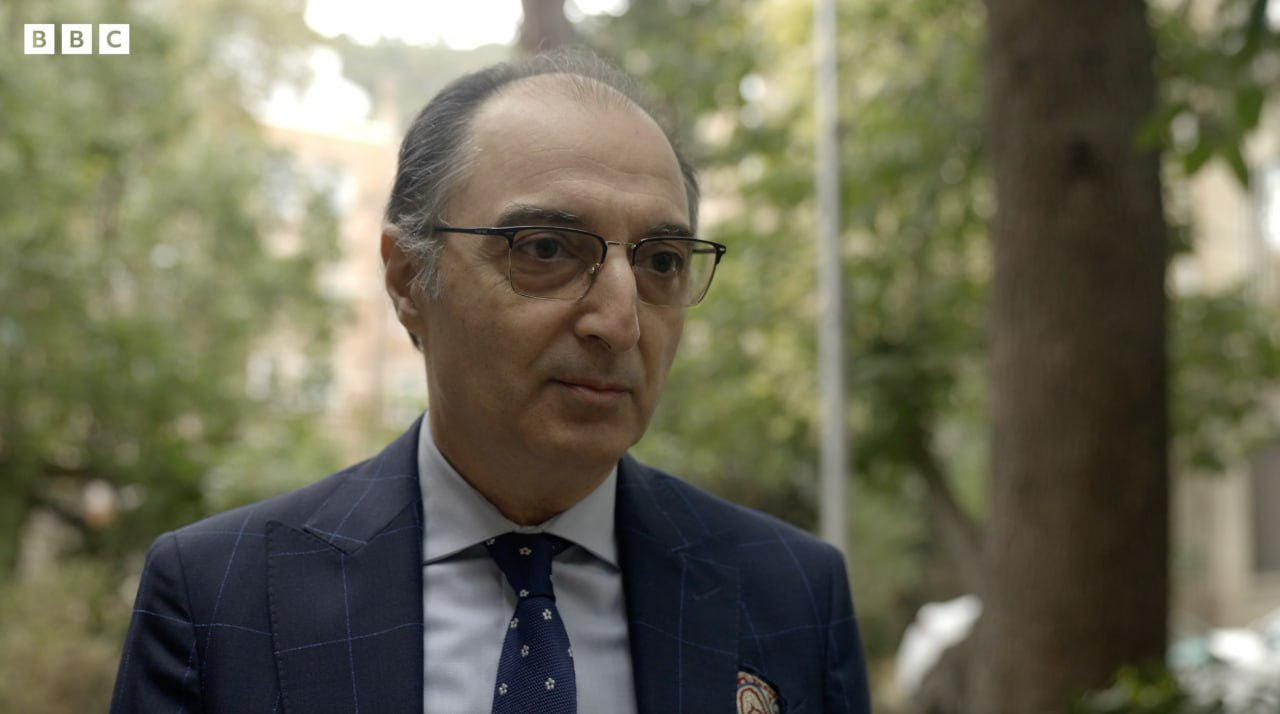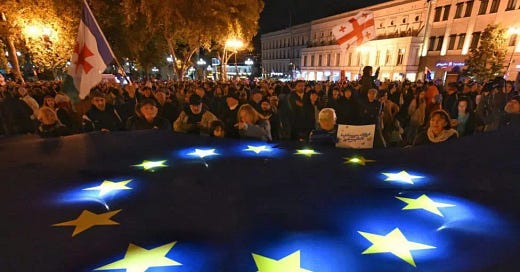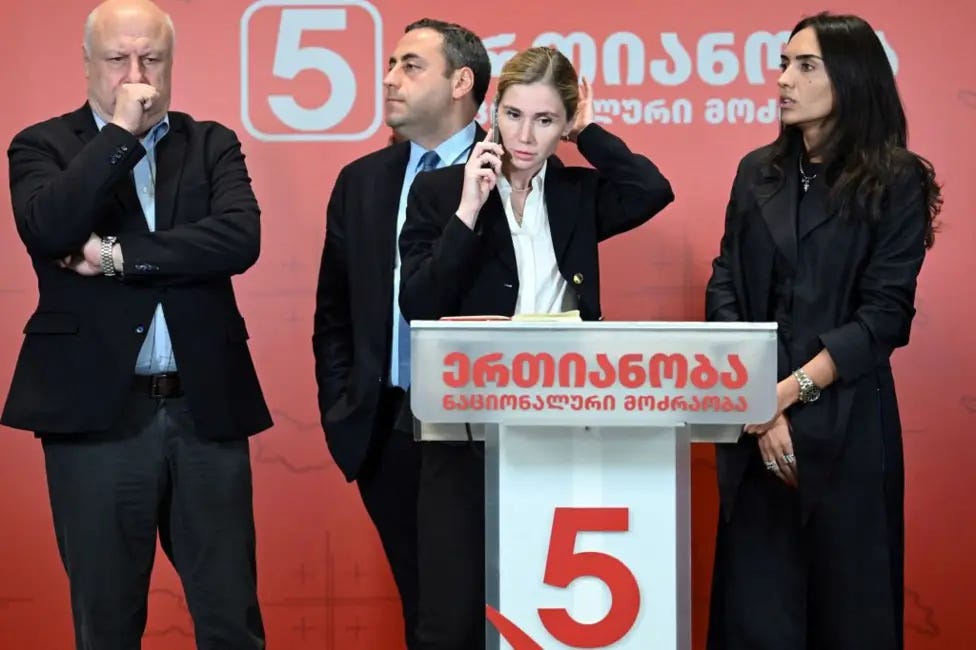Most Georgians want to join the EU, so why did so many vote for the ruling Georgian Dream?
Two decades on from the Rose Revolution, Georgia again stands at the crossroads as the party opposition supporters are dubbing Russia's Dream wins a divisive election.
By Olga Ivshina and Nina Akhmeteli.
Much anticipated elections in Georgia have left the country divided. Official preliminary results from the Central Election Commission have given the incumbent Georgian Dream party an outright majority, but opposition parties claim the election has been stolen and have called on their supporters to join a protest in the capital Tbilisi on Monday evening. More than 20 years on from the popular revolution which put the country on a path to democracy and pro-European reform, why has Georgia once again found itself at a political crossroads?
At a late-night press conference on Sunday, Georgian president Salome Zurabishvili had a clear message for voters.
"I do not recognize these elections,” she said. ’These elections cannot be recognized. This is the same as recognizing Russia's arrival here, and subordinating Georgia to Russia."
Speaking after consultations with the four opposition parties who had crossed the 5 per cent threshold to win a seat, she said the results had been “totally falsified” and Georgians had fallen victim to ‘a Russian special operation’.
It was a stark message from a woman who was elected in 2018 in part with the support of Georgian Dream, but now calls herself ‘the only independent institution left in the country’.
With demonstrations planned for Monday evening, and opposition MPs saying they will refuse to take up their mandates, what happens next for Georgia, and how did a country which has spent the past two decades implementing democratic reform, end up in such a political impasse?
New system, old tricks?
One of the key things which made this election different, was that it was run under a new electoral system.
In some ways this clearly played to the advantage of Georgian Dream, the party that has been in power for the past 12 years.
For the first time all 150 seats in parliament were allocated through proportional representation, rather the previous mixed system, and crucially the new rules prohibited the formation of electoral blocs.
This meant opposition parties only had the option to come together as a single political entity, and run a united list.
But internal disagreements on policy issues made this a much more difficult task.
As a result, the election saw three different opposition alliances and one additional party, all of whom support swift integration with Europe and the West.
Opposition parties hoped that between them they could secure more votes than the ruling party and then form a coalition majority in parliament.
But the reality was that Georgian Dream was able to single out and discredit individual opposition parties and exploit the perceived lack of unity between them.
It also left the electorate without a clear and unifying choice of who to vote for, says former diplomat Giorgi Badridze who is now an analyst at the Georgian Foundation for Strategic and International Studies.

“When the opposition refused to unite under a single banner, they effectively declined to make these elections a referendum on the country’s European future,” he told the BBC. “In doing so, they lost part of the vote—especially from the segment of Georgian society that didn’t want to affiliate with a single specific party.”
This was especially the case with the young generation, most of whom came of age after the 2003 Rose Revolution and Georgia’s move towards European integration.
"The youth of Georgia could have been the main hope and saviour of the opposition in this election,” Badridze added.
“The vast majority of young people support Georgia's European path, but they don’t necessarily identify with any specific party. And therein lay the problem,"
Sweeping victory or clever vote manipulation?
According to preliminary data from the Central Election Commission, Georgian Dream received approximately 54% of the votes (with 99.3% of ballots processed at the time of publication).
The opposition claims that these numbers are the result of manipulation, and independent election monitors have expressed concerns about the way the election was held.
The Georgian, My Voice monitoring mission, which includes 30 non-governmental organizations, documented over 200 violations—such as ballot stuffing, attacks and assaults on observers, and the expulsion of journalists accredited to cover the elections.
The OSCE-lead international observer mission said the poll had been marred by ‘an uneven playing field, pressure and tension’.
Georgia's prime minister, Georgian Dream MP Irakli Kobakhidze meanwhile has rejected allegations of vote rigging.
“Irregularities happen everywhere, in every country," he told the BBC.

There has been much discussion about the new electronic vote-counting system now operating in most polling stations.
On one hand, the automation of ballot processing makes it more difficult to manipulate the results, but on the other hand, critics say it has also led to the increased use of subtler methods to influence the election outcome.
"We are still a very poor country,” says Giorgi Oniani, Deputy Director of Transparency International Georgia. “So many people are financially vulnerable.”
“For example, being included in a social welfare program can be very important to a person. Or, if someone has a small business, they may need specific help from the government. And suddenly they are told, ‘Yes, we are here, we can do this for you.’ Or, for example, a person lost their driver’s license due to drunk driving, and then they are offered to have it reinstated in exchange for a ticking the right box on the ballot paper.”
Another scheme identified by the Transparency International team is so-called “document rental”.
“On the eve of elections, people are asked to hand over their IDs for a day in exchange for monetary compensation. In some cases, these IDs are used by other people to vote; in others, they simply ensure the person does not show up to vote,” Oniani told the BBC.
In a variation on the ‘document rental’ scheme, Natia Mezvrishvili, from the For Georgia Party, told the BBC, they had evidence of cases where opposition supporters simply had their ID cards confiscated in order for others to use them to vote.
Why is the Georgian Dream so popular?
When the voting ended on Saturday night Georgia’s main TV channels immediately published their exit polls, and the results were markedly different.
The pro-government TV channel Imedi gave the ruling party Georgian Dream 56.1% of the vote—close to the numbers later announced by the Central Election Commission.
Two opposition channels, Mtavari and Formula, put Georgian Dream at 40-42% - a result which led to opposition parties claiming they, collectively, had won the election.
But even 40% is still a significant proportion of the vote for Georgian Dream. So how could a party often accused of serving Russian interests, enjoy such support in a country where nearly 80% of the population favours EU membership?
One area where Georgian Dream has clearly struck a chord with voters, is by positioning itself as a defender of conservative values.
According to the World Values Survey, a global poll of social attitudes lead by academics from top universities across the world, Georgia ranked 82nd out of 88 countries surveyed between 2017 and 2022 in terms of tolerance: over 90% of respondents stated they do not accept homosexuality.
Georgian Dream has used this to its advantage in its campaigning, promising to ‘protect’ Georgians from ‘LBGT propaganda and promotion’.

Another message which has resonated with voters is that this election is a choice between peace and war.
Georgian Dream leader Bidzina Ivanishvili, a billionaire who made his fortune in Russia in the 1990s, has long argued that Georgia was at threat from what he called ‘the global party of war’. His speeches are full of warnings of conspiracies by “internal and external enemies” poised to bring violence and destruction to Georgia.
During the election many Georgian Dream election posters showed the contrast between bombed out cities in Ukraine, and peaceful scenes in Georgia.
“This was the main message and trump card for ‘Georgian Dream,’” says veteran political scientist Gia Nodia. “‘If it’s not us, then there will be war’—this resonated with many people. Even though, from a rational standpoint, it wasn’t entirely convincing, it worked on an instinctive level—everyone fears war.
Former diplomat Giorgi Badridze agrees.
"When you are constantly told there is a high risk of war with a neighbouring country, many people simply believe it and are afraid, which is understandable," he says.
Georgian Dream politicians are careful not to provide details about the supposed dangers facing the country, he adds.
They describe threats in very broad terms, which, on one hand, plays into deep-seated fears and, on the other, makes it harder for the opposition to refute the claims effectively.
Another key point is that despite the war rhetoric and the warnings about ‘LGBT propaganda’, Georgian Dream still continues to position itself as the party which will lead Georgia into the European Union -- while at the same time maintaining a balance in relations with Moscow.
" By 2030, Georgia will be a country well-prepared to join the European Union,” Georgian Dream MP Maka Bochorishvili, told the BBC.
“It is in our hands to make this country better, to improve the economy, and to raise the social standards of our citizens to European levels. This is what we can do, and we have been doing it for many years.”
Opposition figures and some analysts are sceptical of these promises.
They point out that the ruling party triggered the deepest crisis in Georgia’s relationship with western countries in 20 years, by enacting the "Foreign Influence Transparency Law" (also known as the foreign agents law) despite widespread protests.
As a result of the new law, Georgia's EU membership process was suspended, and the United States—a strategic partner of Tbilisi—began reassessing its bilateral relationship.
In addition dozens of Georgian Dream representatives and officials have been placed under US visa restrictions for “undermining Georgia’s democracy,” and several Georgian nationals, including two high-ranking Ministry of Internal Affairs officials, have been put on the sanctions list.
So what happens next?
"I think the opposition was euphoric after the exit polls, but after the official results were announced, it fell into a state of depression and remains uncertain," says political scientist Gia Nodia.
Right after the first official results, they took a pause to discuss the timing and strategy for protests. This delay may work to Georgian Dream’s advantage.
Giorgi Badridze agrees: "In 2003, when the government at that time tried to steal the elections, the protests had highly respected and energetic leaders. This time, the opposition lacks a single prominent leader. I’m not sure how well our society can self-organize or how effectively today’s opposition can lead these protests."
As opposition supporters begin gathering outside parliament in Tbilisi on Monday night, Gia Nodia is not holding his breath.
"There will be protests,” he says “But I don’t expect them to be large enough to lead to any significant political results."
Read Olga’s story in Russian here.
English version edited by Jenny Norton.
Here is our special report from Tbilisi — with English subtitles.







